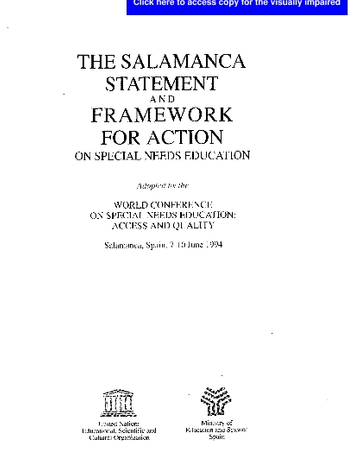The Salamanca Statement and Framework for Action on Special Needs Education is a document that was adopted by the United Nations Educational, Scientific, and Cultural Organization (UNESCO) in 1994. It advocates for the inclusion of all children, regardless of their abilities or disabilities, in mainstream schools and calls for a shift from segregated special education towards inclusive education systems.
The statement recognises that all children have the right to education and that the education system should be designed to meet the needs of all learners. It emphasises the importance of early identification and intervention for children with special needs and the need for collaboration between parents, teachers, and other professionals to support the education of children with special needs.
The framework for action provides guidance on implementing inclusive education policies and practices, including the need for teacher training, adapting the curriculum and teaching methods to meet the needs of all learners, and providing appropriate support services and resources.
The Framework for Action on Special Needs Education was a landmark document that helped shift education systems’ focus from segregation towards inclusion. The statement recognised that special needs education should not be a separate or isolated system but rather an integral part of the education system as a whole.
The Salamanca Statement outlined several critical principles for inclusive education, including the importance of:
1. Early identification and intervention: The statement emphasised the need for early identification of children with special needs and the provision of appropriate support and intervention to meet their needs.
2. Collaboration and partnerships: The statement recognised the importance of partnerships between parents, teachers, and other professionals in supporting children with special needs education.
3. Inclusive policies and practices: The statement called for developing inclusive policies and procedures to ensure all children had access to quality education.
4. Adaptation of the curriculum and teaching methods: The statement emphasised the need to adapt the curriculum and teaching methods to meet the needs of all learners.
5. Support services and resources: The statement called for providing appropriate support services and resources to enable children with special needs to participate fully in the education system.
The Framework for Action guided how to implement these principles in practice. It emphasised the need for teacher training, the development of appropriate assessment and evaluation methods, the provision of resources and support services, and the involvement of parents, communities, and other stakeholders in the education process.
The Salamanca Statement and Framework for Action on Special Needs Education have significantly impacted education policies and practices worldwide. Today, many countries have adopted inclusive education policies and procedures. There is still a growing recognition of the importance of ensuring that all children have access to quality education, regardless of their abilities or disabilities.


